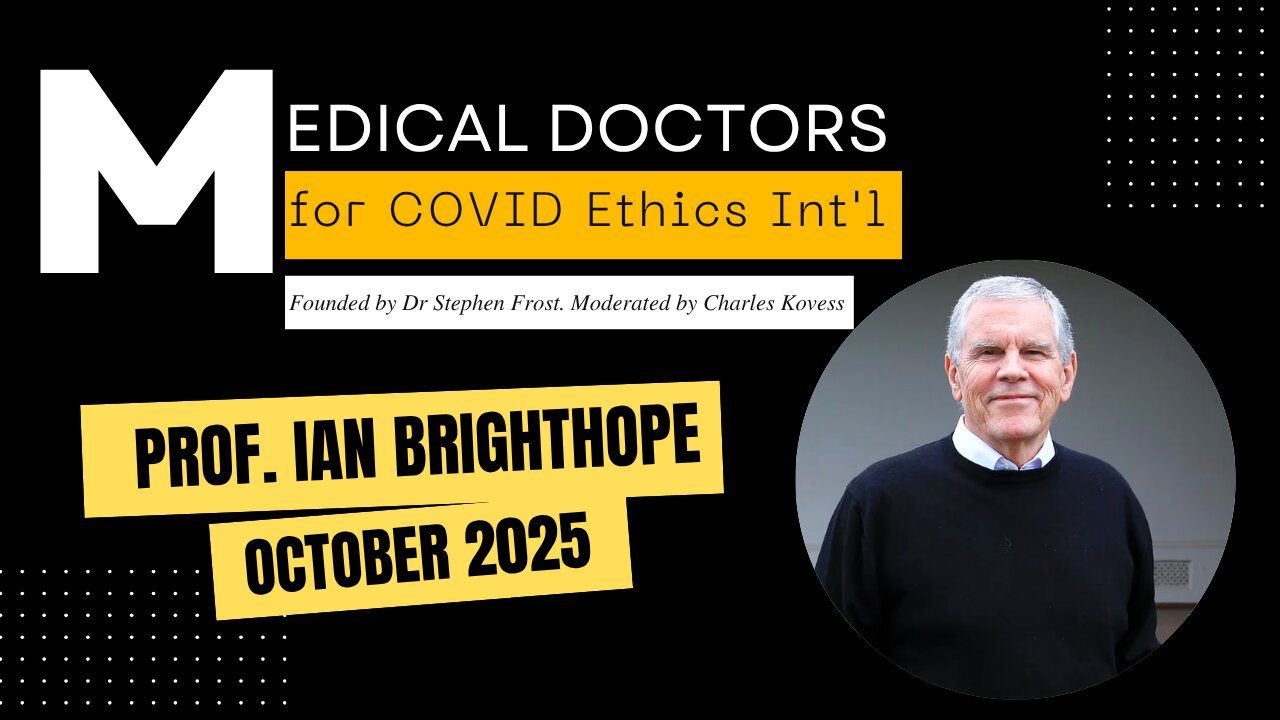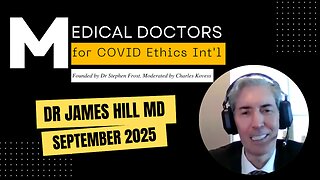Premium Only Content

Professor Ian Brighthope
PROFESSOR BRIGHTHOPE’S TOPIC:
A Real Wellness and Health Care System for the World — Designed in Australia
Executive Summary
Overview of the current crisis in global healthcare.
Why Australia is uniquely positioned to lead.
The blueprint for a preventive, integrative, transparent, and ethical system.
Introduction: The Failure of the Current System
Rising costs, chronic disease epidemics, and system collapse
The pharmaceutical capture of medicine.
The COVID-19 lesson: confirmation bias, censorship, and medical authoritarianism.
The case for nutritional and environmental and integrative medicine as a foundation.
2. Vision and Guiding Principles
Health as a human right.
Wellness before illness.
Citizen sovereignty, informed consent, and transparency.
Root causes before symptoms.
3. Governance Framework
Creation of a National (International) Wellness Authority (NWA/IWA).
Royal Commission on medical and regulatory failures.
Citizen oversight councils.
Blockchain + AI for auditing and anti-corruption.
Open-source health data commons.
4. System Architecture
A. Individual Wellness Layer
AI health coaches, wearables, micronutrient testing, personalized lifestyle protocols.
B. Community Wellness Hubs
Blending GPs, integrative doctors, naturopaths, allied health.
Education and prevention at the local level.
C. Hospital and Specialist Layer
Integrative hospitals.
Cancer care revolution.
Emergency and acute care integration.
5. The AI Ecosystem
Role of causal inference AI.
Domain-trained medical LLMs (BioGPT, Med-PaLM 2, etc.).
Conversational wellness agents.
Blockchain-linked audit AI.
Predictive analytics for public health.
Ethical guardrails.
6. Implementation Roadmap
Phase 1 (0–3 years): Foundations and pilots.
Phase 2 (3–7 years): Expansion and integration.
Phase 3 (7–15 years): Global leadership.
Funding, training, and workforce transformation.
Policy levers (Medicare, taxation, education).
Phase accelerants
7. Safeguards and Ethics
Human-in-the-loop.
Informed consent and patient choice.
Decentralisation to prevent capture.
Rights vs obligations.
Local vs international anti-digital AI cooperation.
8. Why Australia?
The ACNEM, NIIM, AIMA et al legacies.
Medicare’s universal framework.
A manageable pilot population.
Geopolitical independence.
9. The Outcome:
A New Era in Global Health
Economic benefits: reduced burden of disease, increased productivity.
Social benefits: stronger communities, resilience, and trust.
Global benefits: a model exportable to all nations.
A call for international collaboration.
BIOGRAPHY - IAN BRIGHTHOPE
Professor Ian Brighthope graduated in Agricultural Science in 1965. For the next three years he was involved in teaching and research. His research interests were in the fields of agriculture and veterinary nutrition, including the nutritional health of cattle, horses, sheep, dogs, pigs and poultry. His involvement in the design and implementation of field trials provided him with a deep respect for scientific methods, its strengths and its weaknesses.
In 1969 he entered medical school at the University of New South Wales and following three preclinical years, completed his clinical studies at Monash University in Victoria, graduating with a Bachelor of Medicine and Bachelor of Surgery in 1974. After completing his residency and a year of general medicine and anaesthetic practice, he travelled widely throughout Europe, North America and Asia searching for solutions to the problems created by the significant gaps he recognised in the normal medical training of doctors. This travel and its educational processes to learn about all forms of medicine and healing has continued throughout his career.
His interest in the implications of human nutrition and the environment in health and disease commenced in his undergraduate training in the 1960’s and as a doctor and has continued to develop throughout his career. It was in the fields of plant and animal nutrition that Professor Brighthope became aware of the importance of optimum nutrition and the use of nutritional supplementation in animal production, the treatment of animal dysfunction and the potential of this approach in the prevention and treatment of human disease. Also, the addition of agricultural and food processing chemicals to the food chain concerned him and this resulted in his investigating their harmful effects on human health in general, and in particular, the human nervous, immune and endocrine systems. Neglect of these areas of human care prompted him to adopt the nutritional and environmental medicine approaches in his medical practice, which was the first of its kind in Australia.
The Brighthope Clinics and Biocentres were developed in the 1970’s. They specialised in Nutritional and Environmental Medicine with particular interests in psychiatric diseases, learning and behaviour disorders, cancer patient care, heart disease, psychological disorders related to foods and chemicals, the chronic fatigue syndrome, arthritis, asthma, food and chemical sensitivities, auto-immune diseases, diabetes and the treatment of acute viral illnesses and other conditions with megadoses of intravenous Vitamin C and other nutrients. The antioxidant and intravenous Vitamin C clinics under his management were the first of their kind in Australia. They treated patients from all walks of life from all over the world. The Brighthope Clinic was the first Integrative Medicine Centre in Australia in which modalities such as herbal medicine, acupuncture, chiropractic, meditation, intravenous nutritional therapies and others were integrated with mainstream and hospital medicine in the 1970’s.
In the early 1980’s, he coined the term ‘Integrative Medicine’. This term was adopted by the Australasian Integrative Medicine Association (AIMA), which has become a significant force in changing the practice of orthodox medicine in Australia. Professor Brighthope was closely involved in the establishment of Integrative Medicine in Australia.
Chelation therapy was started in the early 1980’s and continues to be of great clinical value to patients with cardiovascular diseases, diabetes and many other disorders in which heavy metal burdens are a problem to their health and wellbeing. Chelation therapy for patients with cardiovascular disease has recently been hailed as a potentially very valuable therapy by the American Heart Association, a development that seemed impossible a few years ago. The Brighthope Biocentre was the first EDTA Chelation Centre in Australia in which holistic detoxification programs were established in conjunction with megadose intravenous Vitamin C therapy. The approach to the management of many diseases in his centres was always based on science and frequently innovative and always safe. These modalities are now taught to medical practitioners in Australia and are routinely practiced by ACNEM trained medical practitioners.
As president of ACNEM, Professor Brighthope pioneered the first post-graduate medical course in nutrition in Australia and remained on the faculty as one of its principal lecturers from 1980 until 2007. In August 2007 he was awarded the Inaugural ACNEM award in recognition of more than 25 years of outstanding service in the field of Nutritional and Environmental Medicine including 25 years as founding President of the College. He initiated the ACNEM fellowship program and examinations and now plays a pivotal role in maintaining, as an official ambassador, ACNEM as the peak body in Nutritional and Environmental Medicine in Australia and Asia.
A quality assurance and continuing medical education program is an integral part of the qualifying fellowship program. Professor Brighthope, in association with Professor Avni Sali, formed the Graduate School of Integrative Medicine at Swinburne University in 1996, at which he was honoured with a Full Professorship. This school has subsequently been succeeded by other programs, in particular, the National Institute of Integrative Medicine at which Professor Brighthope is a director.
Professor Brighthope has published extensively for the general public and has appeared regularly in the media as an advocate of nutritional and environmental health. He is the author of 5 books and many scientific and medial lectures and reviews. His books have been endorsed by many luminaries, most notably the late Linus Pauling, the only person to have ever been awarded two unshared Nobel Prizes.
Over three decades Professor Brighthope had a very busy lecturing schedule to health professionals and the public in Australia and internationally. He continues to consult for the manufacturing industry in nutrition and micronutrient supplementation and supervises and consults for various health resorts and specialist clinics, preventive medicine programs and sporting concerns. He and his companies have initiated and/or sponsored many major events in Nutritional Medicine in Australia for more than 35 years, including international and national conferences and University based research.
For more information about Ian Brighthope, you can read further here: https://rumble.com/v6oy2k3-professor-ian-brighthope.html
-
 3:12:33
3:12:33
Charles Kovess
26 days ago $1.78 earnedDr James Hill MD
1.09K5 -
 LIVE
LIVE
ZWOGs
2 hours ago🔴LIVE IN 1440p! - ARC RAIDERS SERVER SLAM - Come Hang Out!
54 watching -
 9:22
9:22
Colion Noir
8 hours agoArmed Woman Drags Gunman Out of Store Before Firing Two Shots
79.7K40 -
 1:04:17
1:04:17
Jeff Ahern
4 hours ago $1.23 earnedThe Saturday Show with Jeff Ahern
22K7 -
 LIVE
LIVE
Reidboyy
5 hours agoCamo King Grinds 100% Completion for Battlefield 6 *SECRET* Mastery Camo (All Badges + Camos 100%)
15 watching -
 LIVE
LIVE
Biscotti-B23
2 hours ago🔴 LIVE NEW INFO ON KAIGAKU & ZENITSU INFINITY CASTLE 🔥 DEMON SLAYER HINOKAMI CHRONICLES 2
13 watching -
 LIVE
LIVE
NeoX5
2 hours agoPixel Art Horror | Shocktober | Rumble Gaming
25 watching -
 44:34
44:34
Chris Harden
2 days ago $1.52 earnedWhat Happened to Rock Island, Illinois?
24.5K12 -
 30:56
30:56
Advanced Level Diagnostics
6 days ago $0.91 earned2004 Chevy Silverado - Won't Shut Off!
24K2 -
 7:05
7:05
Spooky Grandpa's Scary Stories
7 months agoThose Who Linger - Halloween, Ghost Stories, Horror, Haunted, Cemetery, Folklore
18K17